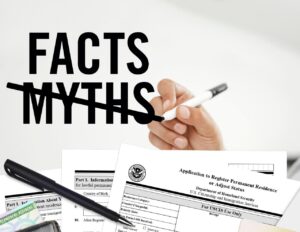Comprehensive Immigration Solutions
Common Misconceptions of VAWA Self-Petition
Navigating the Violence Against Women Act (VAWA) application process can be complex, and misinformation can add unnecessary stress to an already challenging situation. In our commitment to providing accurate and valuable information, we aim to dispel five common myths surrounding VAWA applications.

Myth 1: The Abuse Must Be Physical
While physical abuse is a valid criterion for VAWA eligibility, it is essential to dispel the misconception that it is the only form of abuse recognized. VAWA also acknowledges verbal and emotional abuse as forms of domestic violence, and depending on the circumstances, they may qualify as extreme cruelty, a requirement for VAWA self-petition. Our firm routinely includes evidence of psychological abuse, verbal abuse, emotional abuse, sexual abuse, financial abuse, and any other instance of mistreatment. Our firm has been successful on VAWA cases with no physical abuse.
Myth 2: Only Women Qualify for VAWA
VAWA is not exclusive to women; men who have suffered domestic violence at the hands of a U.S. citizen or permanent resident spouse can also qualify for a self-petition under VAWA. In fact, most of our firm’s VAWA clients are men. It is crucial to recognize and address the diverse experiences of all survivors, regardless of gender.
Myth 3: A Police Report is Required
While police reports can provide valuable evidence, they are not mandatory for a VAWA self-petition. Survivors may fear involving law enforcement due to various reasons, and VAWA acknowledges this by not making a police report a strict requirement for eligibility. We file almost all VAWA cases without a police report and have won VAWA and green cards where there was no physical violence and no police report.
Myth 4: Immigration Will Contact Your Abuser
VAWA includes confidentiality provisions that prohibit the government from contacting or informing the abuser about the self-petition. Survivors can seek protection without the fear of their abuser being notified by immigration authorities.
Myth 5: Marriage to Your Abuser is a Requirement
Contrary to popular belief, you do not need to be married to your abuser at the time of filing for a VAWA self-petition. Survivors can still qualify if they file within two years of their divorce from the abuser. Additionally, if a survivor believed they were married to the abuser, but the marriage was invalid or unlawful, they may still be eligible for VAWA protection. Please note you do not have to be divorced or separated to qualify for VAWA. If you no longer live with your spouse and you are still legally married, you may still be eligible to file VAWA.
Conclusion
Being well-informed is crucial when navigating the complexities of VAWA applications. Dispelling these common misconceptions ensures that survivors of domestic violence can access the protection they need and deserve.


